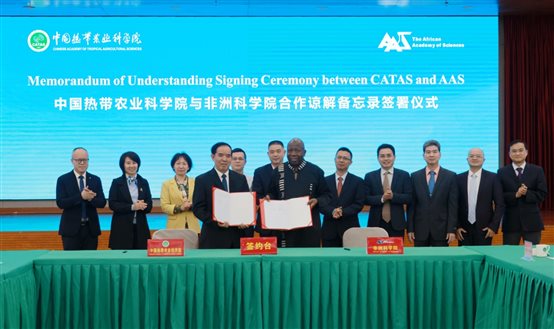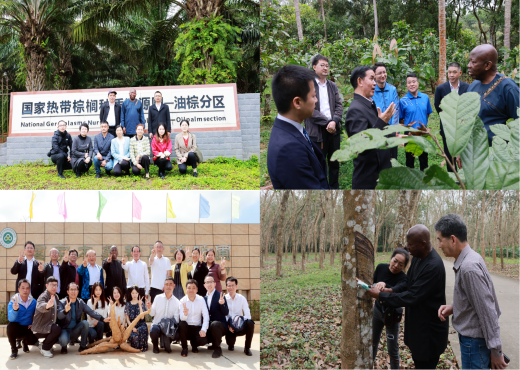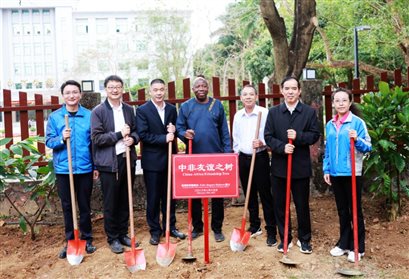
The Chinese Academy of Tropical Agricultural Sciences (CATAS) and the African Academy of Sciences (AAS) signed a Memorandum of Understanding (MOU) for cooperation during the visit of AAS President Dr. Felix Dapare Dakora to the CATAS from Feb. 14 to 19, 2023.
The visit aimed at expanding a new type of strategic partnership between China and Africa, and intensifying China-Africa cooperation in tropical agricultural S&T. The two sides reached a consensus on furthering China-Africa cooperation in tropical agricultural S&T and improving food security in Africa, among other things, and signed the MOU for cooperation at a meeting in Haikou, Hainan Province.
The two sides identified a range of areas for cooperation, including selection, breeding, and extension of plant variety, environmental protection, control of plant pests, diseases, and weeds, establishment and promotion of a sustainable farming system, livestock, agro-product processing technologies, agricultural machinery R&D and extension, agricultural economy, and human resource development. The two sides agreed to strive to increase tropical agricultural productivity, and improve food security and rural livelihoods through personnel exchanges, dispatching experts, training, cooperative research, technology cooperation, and field demonstrations.
In his meeting with AAS President Dakora, CATAS Vice President Liu Guodao stated that the CATAS has long been committed to China-Africa cooperation in tropical agricultural S&T, taking charge of the establishment of China-aided Agricultural Technology Demonstration Center in the Republic of the Congo and initiating the China-Africa Tropical Agriculture S&T Innovation Alliance.
The CATAS is one of the first groups with accredited qualifications for demonstration and training in modern agricultural technology under the framework of the Forum on China-Africa Cooperation and has trained nearly 3,000 agricultural technicians for Africa. Thanks to CATAS’s efforts, a large number of new technologies, new products, and new equipment have been put into use in Africa. Vice President Liu hoped that the two sides could leverage the signing of the MOU to upgrade China-Africa cooperation in tropical agricultural S&T, safeguard food security in Africa, and facilitate the building of a China-Africa community with a shared future.

President Dakora said CATAS’s research was impressive, covering a wide variety of areas including the introduction of germplasm resources, field evaluation, product R&D, and marketing. The CATAS demonstrates how research propels development, setting a wonderful example for all research institutes and universities. The AAS looks forward to strengthening cooperation with CATAS in tropical agricultural S&T and personnel training, furthering the extension of China’s tropical agricultural technologies in Africa, increasing Africa’s capacity for tropical agricultural production, and promoting African agricultural development.
During his stay in Hainan, President Dakora visited the Coconut Research Institute, Spice and Beverage Research Institute, Tropical Crops Genetic Resources Institute, and Rubber Research Institute of CATAS. He inspected research bases for coconuts, oil palms, dates, coffee, cocoa, tropical pastures, cassava, tropical flowers, fruit trees, and natural rubber. President Dakora and Chinese agricultural technicians planted a tree together to celebrate China-Africa friendship.
